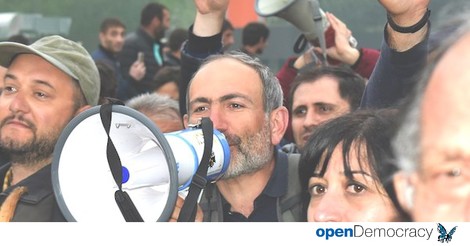Your podcast discovery platform
Curious minds select the most fascinating podcasts from around the world. Discover hand-piqd audio recommendations on your favorite topics.

piqer for: Globalization and politics Global finds
Neil Hauer is an independent analyst focused on Syria, Russia, and the Caucasus. Based in Tbilisi, Georgia, he served as senior intelligence analyst at The SecDev Group, an Ottawa-based geopolitical risk consultancy, for three years. He is presently engaged primarily on Russia’s role in the Syrian conflict.
Saint Nick Of Armenia: How Protest Leader Nikol Pashinyan “Rescued” Armenia And Made It Merry
Four months ago, Armenian opposition politician Nikol Pashinyan remarked seemingly idly to a TV presenter that his political wish from Santa Claus was to deliver the Armenian people the realization that they are not powerless, and that "in fact they decide their destiny". In the past month, these words proved stunningly prophetic, as an unprecedented wave of street protests against reigning leader Serzh Sargsyan forced the newly minted prime minister's resignation and have brought Pashinyan to the brink of the premiership himself. Veteran Armenia watcher Emil Sanamyan provides the most detailed profile of the politician to date.
Pashinyan's recent rise to political stardom began in March, when he referred to his intent to lead demonstrations against Sargsyan's transition to PM as "the need to stop Armenia's Azerbaijanization", i.e. the enshrining of one man's rule. He began his protest march from Gyumri, Armenia's second city, to the capital Yerevan with little fanfare. Pashinyan edited the liberal newspaper Haykakan Zhamanak from 1999 to 2012, suffering regular physical attacks from government supporters during that time. He played a role in Armenia's 2008 election protests, but was arrested as the government remained unshaken. Being elected to parliament in 2012, he became one of the most vocal critics of the leading party while maintaining a hardline stance on the status of Karabakh. As his current protest march reached Yerevan on April 13, his movement quickly picked up popularity. By the time Pashinyan called for Sargsyan's resignation on April 20, the protests had swelled to such a degree that the PM capitulated three days later. Pashinyan's remarkable journey has left him likely the most popular Armenian leader in the country's post-Soviet history, and he is expected to win the May 8 parliamentary vote. While he will now face the challenges of governance, his role in shaking Armenian society from its cynical apathy has already been transformational.
